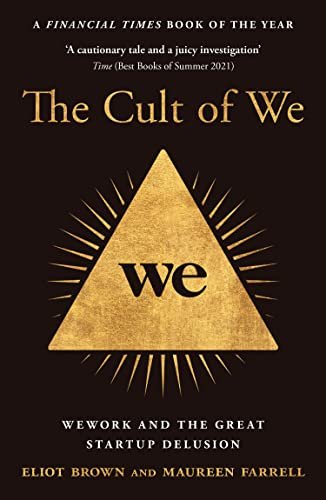The Cult of We: WeWork and the Great Start-Up Delusion (English Edition)


PREGUNTAS FRECUENTES
«Master of the Revels: A Return to Neal Stephenson’s Baroque Cycle» – A Book Review
Neal Stephenson’s Baroque Cycle is a literary masterpiece that has captivated readers’ minds ever since its publication. The series, consisting of three books, showcases Stephenson’s vast knowledge of history, science, economics, and politics. The Baroque Cycle is so comprehensive and nuanced that it’s nearly impossible to summarize in a few sentences. Instead, I’ll focus on one of its most intriguing aspects: the character of Jack Shaftoe, a central figure in the series, and the subject of the book «Master of the Revels: A Return to Neal Stephenson’s Baroque Cycle.»
Written by science fiction author and historian, David N. Schwartz, «Master of the Revels» aims to analyze and explore the character of Jack Shaftoe, who is both complex and multifaceted. Schwartz does justice to the character and paints an intricate portrait of him, highlighting the intricate symbolism and motifs woven into his storyline.
Schwartz’s book is divided into three sections, each focusing on different aspects of Jack Shaftoe’s character. The first section covers his backstory, and we learn about his childhood, how he became a soldier and how his experiences have shaped him as a person. The second section focuses on his relationships with various characters in the series, from his deep bond with Eliza to his various clashes with the English nobility. Finally, the third section examines the deeper philosophies and ideas that underpin his character, including his role in the larger conflict between science and religion.
While Schwartz’s book is primarily intended as a critical analysis of Jack Shaftoe’s character, it is also a love letter to the Baroque Cycle as a whole. The level of detail and analysis that Schwartz provides will undoubtedly appeal to devoted fans of the series, but I also believe the book has the potential to spark interest in the series for new readers.
Schwartz’s writing style is both clear and engaging, making the book an easy read despite the complexity of the topics covered. His analysis is often insightful and thought-provoking, and he does an excellent job of drawing connections between different events and themes within the series.
One of the most impressive aspects of «Master of the Revels» is Schwartz’s ability to bring together seemingly unrelated elements and create a cohesive whole. For instance, he draws parallels between Jack Shaftoe’s experiences as a soldier and the broader themes of war and conflict that permeate the series.
Another highlight of the book is Schwartz’s discussion of the broader historical and cultural context in which the Baroque Cycle is set. He skillfully considers how different social, political, and economic factors influence the character of Jack Shaftoe and the other figures in the series.
In conclusion, «Master of the Revels: A Return to Neal Stephenson’s Baroque Cycle,» is a fascinating book that provides a comprehensive analysis of the character of Jack Shaftoe while also exploring many of the broader themes and ideas present in the Baroque Cycle. If you’re a fan of the series or interested in literary analysis, then this book is highly recommended.
1. ¿Qué es The Cult of We: WeWork and the Great Start-Up Delusion?
Es un libro que explora la historia de la compañía WeWork y su fundador, Adam Neumann, así como la cultura de las empresas emergentes en Silicon Valley y más allá.
2. ¿Quién escribió The Cult of We?
El libro fue escrito por Eliot Brown y Maureen Farrell, dos periodistas que han cubierto la historia de WeWork y otros aspectos del sector de start-ups.
3. ¿Cómo empezó la compañía WeWork?
WeWork fue fundada en 2010 por Adam Neumann y Miguel McKelvey como un espacio de trabajo compartido para emprendedores y trabajadores independientes.
4. ¿Por qué WeWork tuvo tanto éxito inicialmente?
WeWork creció rápidamente gracias a su enfoque en la comunidad y el diseño de espacios de trabajo modernos y atractivos que atraían a los trabajadores jóvenes y urbanos.
5. ¿Qué sucedió después de que WeWork se convirtiera en una compañía de cotización pública?
WeWork intentó salir a bolsa en 2019, pero su oferta pública de venta (OPV) fracasó debido a preocupaciones sobre su modelo de negocio y las prácticas de Neumann.
6. ¿Cuáles fueron las principales críticas sobre el modelo de negocio de WeWork?
Los críticos argumentaron que el modelo de negocio de WeWork era insostenible porque la compañía estaba asumiendo grandes cantidades de deuda para expandirse, pero no tenía suficientes ingresos para cubrir sus gastos.
7. ¿Qué papel desempeñó Neumann en la cultura de la empresa WeWork?
Neumann fue la fuerza impulsora detrás de una cultura empresarial que se centraba en la «comunidad» y en la creación de una marca personal única para él mismo.
8. ¿Qué lecciones se pueden aprender del fracaso de WeWork?
El fracaso de WeWork sugiere que las empresas emergentes necesitan centrarse en construir negocios sostenibles y evitar la creación de culturas empresariales tóxicas y autocomplacientes.
9. ¿Qué impacto ha tenido la historia de WeWork en el sector de las empresas emergentes?
La historia de WeWork ha llevado a una mayor escrutinio de las empresas emergentes y ha llevado a los inversores a exigir un mayor rigor en la valoración de empresas en este sector.
10. ¿Recomendarías The Cult of We a alguien que esté interesado en el mundo de las empresas emergentes?
Sí, The Cult of We es un libro fascinante y bien escrito que ofrece una perspectiva única y crítica sobre el mundo de las empresas emergentes y la cultura empresarial más amplia en Silicon Valley y más allá.






